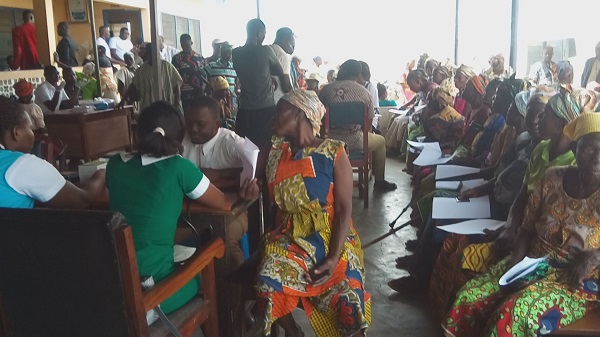
A Deputy Director in charge of Diaspora Affairs at the Office of the President, Nadia Adongo Musah, has announced her plans to push for the creation of separate queues for elderly patients at healthcare facilities across Ghana.
There have been instances of elderly people collapsing in public places whilst rubbing shoulders with young adults in long queues for attention.
Until banks in the country came up with detached counters for senior citizens, incidents of pensioners collapsing in mixed queues and dying as a result kept grabbing the headlines. In one of such cases, a frail old man fainted in a pension queue. And when he regained consciousness, he was given only a bottle of Fanta.
“I will take that personally to the Ministry of Health. That is something I’m going to have a discussion with the Minister of Health on. [We should] not see an elderly person at the hospital in the same line as an 18-year-old who would want to be taken care of before the elderly person. It’s something I will personally take up.
“From where I’m coming from, as we get old, you are put under a different category. So, when you get to a bank, you are on a different queue. When you get to a hospital, you are on a different queue. And these are some of the policies that the Akufo-Addo Government wants to bring back to Ghana. And that’s why [when we come back home from the diaspora] what we’ve learnt over there is what we are bringing back,” the Deputy Director told journalists.
She was speaking Monday in the Upper East region when an aid agency she founded and named after her father— Ntuune Pogyua Foundation— organised a free medical screening exercise for about 300 elderly people at her hometown, Gambibgo, a suburb of the Bolgatanga East District.
Next Year it will be bigger than this— Deputy Director
The free medical screening exercise, which was preceded by a football match between young people and elderly folks Sunday, is part of an “Adopt-a-Senior” project initiated by the foundation to continually cater for senior citizens in the community.
“The goal is to organise a medical checkup at least twice a year, to make sure that once you get old you are not forgotten. We live in a community where someone who gets old comes with some ailments that can be dementia. And dementia— in our community not a lot of education is on it. And someone can be stigmatised as being a witch because all the grandchildren or family members have gone out of the house. But once the education is there that when people get old there are certain ailments that come along, it makes them also feel that they are not forgotten in our community.
“That is why yesterday we started with a football match to connect the young and the old people in an intergenerational community where when you see an old person in your community [you would want to] support them so they don’t feel neglected. A lot of education needs to be done and I hope that by the time we finish this programme, with the support we’ve gotten so far, next year it will be bigger than this,” said the Deputy Director.
Poverty makes People see Old People as Witches— A Beneficiary
Elderly people in the community are expected to gather Tuesday (today) on the premises of the Gambibgo Primary School for a Christmas party organised by the foundation whose founder also promised another medical screening exercise would come off in July, 2019.
High blood pressure, according to some senior medical staff at the Gambibgo Health Centre, dominated Monday’s checkups.

“We have advised them that those we’ll be giving drugs to take, when they go and the drugs are finished, should try and come back to see if there is improvement. If there is no improvement, we would refer them to the Regional Hospital,” said a senior midwife at the centre, Gladys Lariba Wuur.
David Akoubila, a senior community health nurse at the facility, told newsmen as the screening was underway: “Most of them are hypertensive. Basically, we’ve advised them on their diet, to do a lot of exercise and to take a lot of water. So far we’ve attended to 272 people.”
Until Monday, there had been no such medical screening organised for free in that community, according to the beneficiaries— one of whom attributed the witchcraft tag old people often faced in rural areas to poverty.
“Today, as we have come here, I’ve seen that the exercise is good. I appreciate it. If God bless and it goes on like this, we would be happy. It has not happened here before if not today. We old people need help. Somebody can be in the house, look around, even 5 cedis note he can’t get. And if they have come to treat you freely, why won’t they be happy.
“If you are older and you go to hospital, they have to consider you, look [after] you very well so that you leave there [earlier than the young people]. It’s only the poverty that is killing us here. That is why when you see somebody, you think she’s a witch. She is not a witch. It’s because of the poverty. You would not know she likes you,” said one of the beneficiaries, Baba Akonga.
